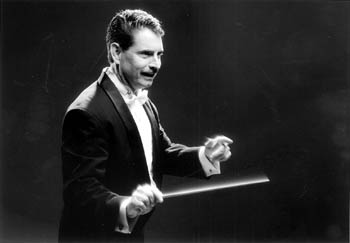![[Metroactive Music]](/music/gifs/music468.gif)
[ Music Index | Santa Cruz Week | SantaCruz Home | Archives ]
Making Symphony History
The Santa Cruz Symphony just delivered one of the best concerts in the history of Monterey Bay music--and there's another chance to hear it
By Scott MacClelland
It may not have been as rare as the BoSox winning the World Series, but for a Watsonville audience last Sunday it was just as exciting. That's what the Santa Cruz Symphony aroused with their reading of Vaughan Williams' symphony no. 4 in F Minor. Larry Granger's long tenure with the orchestra has produced many memorable moments, as well as a few of barking dogs. It has also come up with a substantial number of performances whose quality, technically and expressively, deserves the brass ring.
But Sunday's Vaughan Williams was pure gold, matching the Symphony's high-water mark of October 2000, when Watsonville heard a thrilling, recording-quality performance of Hindemith's Mathis der Maler. (I burned a CD of KUSP's broadcast and marvel at it still as the single finest symphonic performance in the Monterey Bay area I'd heard in 30 uninterrupted years.)
With stats like that, Granger and his orchestra are seriously in the business of setting standards and making history. That may sound far-fetched, considering the talent in the Cabrillo Festival and Carmel Bach Festival orchestras. And under ordinary circumstances the odds, frankly, would be against Granger's regional ensemble. But these spectacular, bases-loaded home runs cannot be ignored.
What does such excellence require? For an orchestra to play out--not just play notes--its musicians have to feel confident. This requires discipline, discipline, discipline. Granger demands it of them no less than of himself. That doesn't make him popular with all his players, but it does command respect and, most important, gets results. It also sharpens the focus of his interpretation, wise or otherwise, as a lens focuses a visual image. For the Vaughan Williams--a thorny, anxious, war-inspired piece that undoubtedly surprised those who only know his English folk-song and pastoral works--Granger's musicians rose to the occasion, and took as much pride in their efforts as in the extraordinary success of their performance. (If you missed it, you can hear it broadcast by KUSP on Feb. 13 at 11am. I urge you to tape it.)
The work itself is a powerful but not easy listen. Anxiety and dissonance inform its every movement. (Preparing its premiere in 1935, the composer is said to have told the orchestra, "Gentlemen, if this is your modern music, you can have it.") Amid its in-your-face intensity, however, the discerning ear will recognize--particularly in the third movement--the contrapuntal and dramatic examples of Gustav Holst's symphonic masterpiece The Planets.
Granger opened his program at the Mello Center with Smetana's Vltava�-called Die Moldau by the Germans, who, though next-door neighbors, have as much difficulty pronouncing Czech as most of my gringo associates have with Spanish. Pace and dynamics developed a keen sense of anticipation in Granger's luxurious barge ride down the river from its headwaters in the southern mountains to Prague, the city that loved Mozart in his own time exactly when jaded Vienna's interest had waned. The orchestra played the overexposed warhorse with verve and polish.
Jon Nakamatsu, the 1997 Van Cliburn First Prize�winner, put totally to rights Mozart's Piano Concerto no. 21 in C, a performance that struck an ideal balance between touch and tone. One cannot serve such music better than to make it sound spontaneous, and this Nakamatsu did, with perfectly contained abandon. It was as if the man had channeled Mozart's heart.
Of course, the Santa Cruz Symphony folks will predictably sing Granger's praises forever, so long as he's their man. And, of course, we critics will inevitably Monday-morning-quarterback the results. Like most conductors, Granger does some things better than others on the interpretive level. But just about all his work, after all these years, is technically excellent. That's certainly a tribute to his orchestra. But great credit must go to Granger. His dedication and self-discipline demonstrate the best of what's possible when a conductor of this skill and imagination is in place long enough to turn an orchestra into his instrument.
Copyright © Metro Publishing Inc. Maintained by Boulevards New Media.
For more information about Santa Cruz, visit santacruz.com.
![]()

The Best of Their Best: The Santa Cruz Symphony's recent performance in Watsonville matched anything they've done under Larry Granger--or anyone else. It will be broadcast by KUSP on Feb. 13 at 11am.
From the February 9-16, 2005 issue of Metro Santa Cruz.